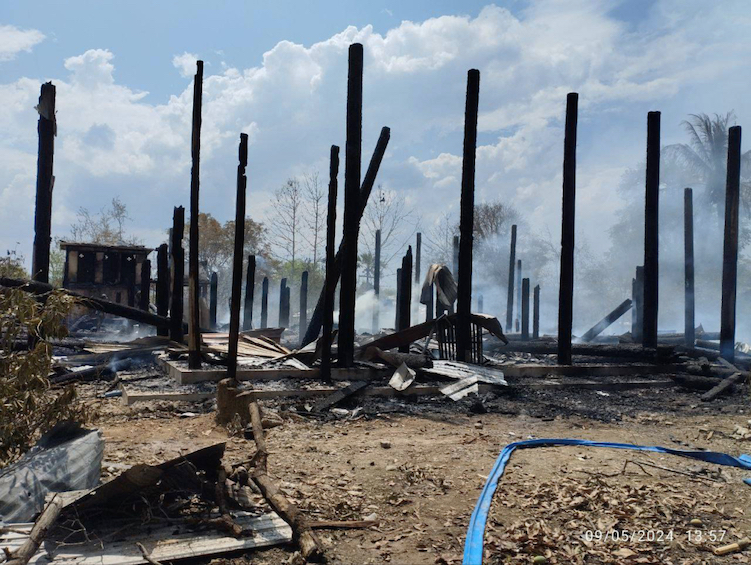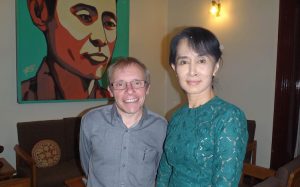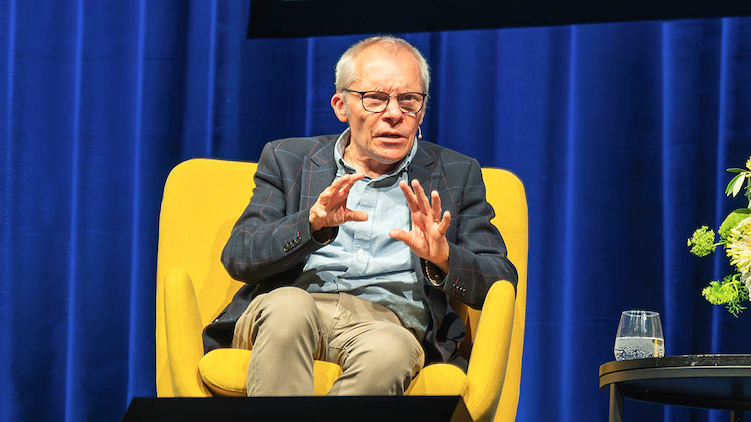Sean Turnell, the Australian professor and former economic adviser to the Suu Kyi government, has called for sanctions to be imposed on the Central Bank of Myanmar, saying it would limit the resources the military junta is using to oppress citizens in the war-torn nation.
In an appeal on Thursday published by the United States Institute for Peace, Turnell says the country’s central bank is the principal actor providing the junta “with the financial resources to wage its wars” against the Myanmar people, as well as the key instrument it uses to thwart international sanctions.
Turnell noted that a recent report by the UN Rapporteur Tom Andrews showed that “sanctions on Myanmar’s banks have proved effective” in reducing the junta’s ability to purchase arms, but said they had also led to “the spectre of a constant game of whack-a-mole against individual banks.”
ALSO SEE: Conflicting Goals Could Limit Outcomes From China’s Plenum
“The Central Bank of Myanmar (CBM) is a vital component of the junta’s war machine. It is a vehicle that funds atrocities and helps keep those perpetrating them free from consequence. It is enabling misrule and the abuse of human rights, while funding the defiance of international norms. It is an accomplice in criminality,” he wrote.
“Just as the central banks of Russia, Iran and Afghanistan have been sanctioned in recent years, so should the CBM. By freezing the assets of the CBM held at the New York Federal Reserve following the coup in February 2021, the US has already done much of the heavy lifting needed — albeit without much appreciation.
“The time has come to extend this to a formal sanction on the CBM, and for other countries to join the US in sanctioning the central bank.”
Aerial attacks on civilians ramped up
Turnell’s appeal comes at a time when the junta has dramatically ramped up aerial bomb attacks on civilians in rural areas where the military has lost territory.
A Burmese nonprofit group that tracks airstrikes carried out by the Myanmar Air Force reported a total of 819 airstrikes between January and April this year – nearly seven a day, which it said killed 359 civilians and injured a further 756. Many of them were women and children, the Nyan Lynn Thit Analytica group said.
Homes, schools, hospitals and religious sites such as churches and monasteries have been subject to frequent aerial strikes.

On the morning of May 9, a monastery in Saw Township’s Ah Kyi Pan Pa Lon village in central Magway Division was hit twice by a fighter jet that dropped bombs, before circling back for a third follow-up attack involving heavy gunfire aimed at people fleeing the initial explosions.
The monastery, seen above, was believed to be roughly 100 years old. It was destroyed, while 12 civilians were slain and 26 more injured.
Given these brutal and ruthless tactics, one of the key goals of the Special Rapporteur and others seeking an end to the civil war in Myanmar is stopping the military, which is entirely dependent on foreign oil and gas, from purchasing aviation fuel.
China, SE Asian neighbours ‘aiding war crimes’
Amnesty International has issued reports stating that Myanmar gets most of its jet fuel from China and Malaysia, and that most is shipped to Thilawa Port near Yangon from a terminal near Ho Chi Minh City via a Chinese oil tanker named ‘Huitong78’.
There were multiple shipments in 2023 and two or three this year, it said, noting that the third probable shipment appeared to come from the United Arab Emirates in May.
“The Myanmar military is relying on the very same Chinese vessel and Vietnamese companies to import its aviation fuel, despite Amnesty International having already exposed that reckless supply chain,” Amnesty’s secretary-general Agnes Callamard said in a report on July 8.
“It is a raw display of both the sheer impunity with which the Myanmar military is operating, and the utter complicity of the states responsible, including Vietnam, China and Singapore,” she said. Amnesty has called for the bombings in Myanmar to be treated as war crimes.”

Central bank ‘guilty’ of multiple offences
For Turnell, the Central Bank of Myanmar is guilty of multiple offences, and has become a collaborator in the junta’s criminality, as it prints vast amount of cash for the military, while using financial technology “to track down and punish resistance to their rule.”
It has seized assets from some 18,000 accounts of people deemed to be resisting military rule, while compelling many companies to do “real-time” monitoring of customers because all accounts are required to link with a registered sim card, national ID and the “mobile money” system has become “an essential part of the military’s surveillance structure and war on the public.”
Three retired generals have been appointed deputy governors of the CBM, while lieutenant colonels are policy and operational section heads.
- Jim Pollard
ALSO SEE:
UN Rapporteur Calls on Thai Banks to Stop Aiding Myanmar Junta
Scamming Compounds in SE Asia Stole $64 Billion in 2023: Report
US, UK and Canada Ramp up Action Against Myanmar Junta
Myanmar’s Central Bank Cancels 120 Forex Licences – RFA
Key Bangladeshi Bank Freezes Myanmar Regime Accounts
UOB to Cut Ties With Myanmar Banks on Sept 1 – Nikkei
EU, US Sanctions Aim to Curb Funds for War in Myanmar
Crime Gangs Control Some Myanmar, Laos Economic Zones: UN
Myanmar Heading For State Collapse, ICG Warns






















